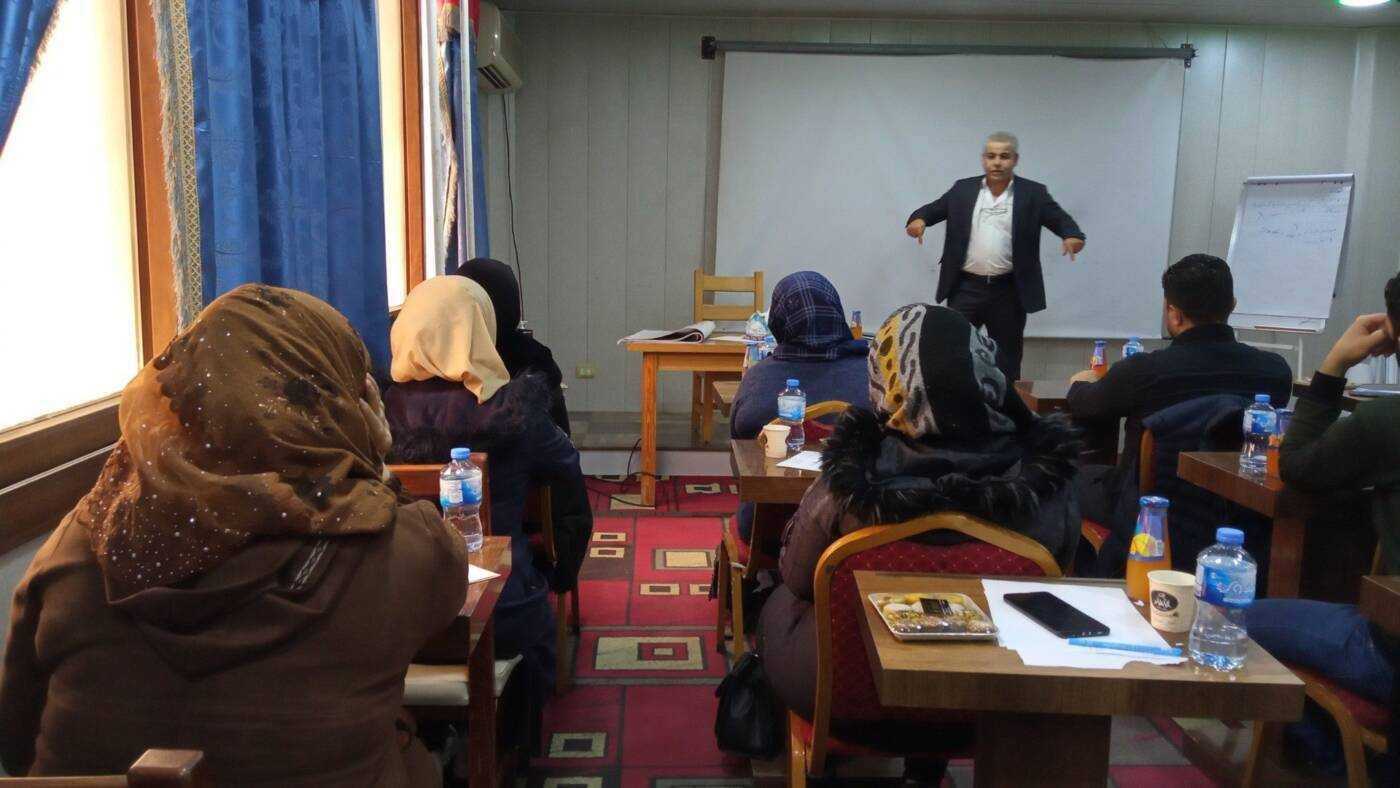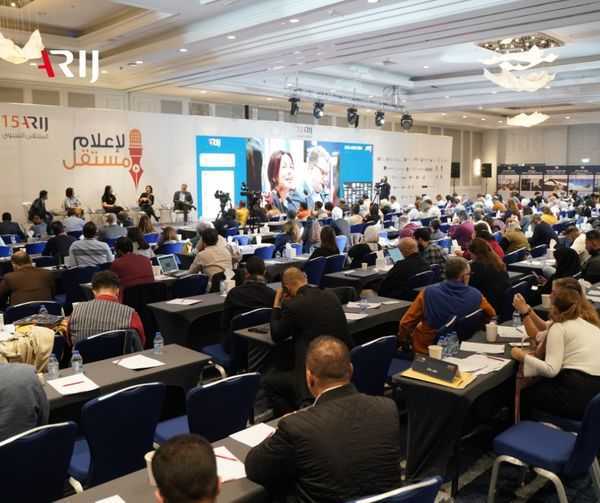‘Confined’: In northwestern Syria, women journalists dream of seizing opportunities abroad
Women journalists in northern Syria—who navigate a wide range of challenges in their work—hope to access professional development opportunities abroad, but are “confined” by borders and a lack of identification documents.
20 December 2022
IDLIB — On December 2, the 15th annual forum organized by Arab Reporters for Investigative Journalism (ARIJ) got underway in Jordan, with the participation of some 3,000 Arab and foreign journalists. The yearly forum is an important opportunity for journalists in various Arab countries, men and women alike.
But attending in person is only a dream for those living in Syria, especially in areas outside regime control. And for female journalists in the northwest, who navigate not only the dangers of working as journalists in Syria, but also a range of additional challenges—from formal discrimination to social barriers—every opportunity matters.
Most workshops and media forums outside Syria’s borders “exclude Syrian women journalists in the north, because travel is an obstacle for them,” said Aseel al-Hamawi (a pseudonym), an editor in Idlib.
After five years of working locally as a journalist, Aseel is eager to “get out of the local box, to get to know the Arab and international press, but this is only available online,” she told Syria Direct. She is ill at ease with what she called “the lack of intervention by parties supporting press freedom” to create solutions to allow women journalists to access opportunities abroad.
Over the past years, female journalists in northern Syria have demonstrated their ability to convey reality, cover and photograph events, even in dangerous locations. At the same time, they have challenged the conditions that surround them, including society’s perceptions of their work.
Reaching this point was the result of accumulated work, experience and commitment to obtaining the knowledge needed to create a free and professional press. To that end, journalists have undergone local workshops to hone their skills, but many hope to participate in activities abroad as a way to build more experience and access opportunities.

Syrian women journalists attend a training workshop overseen by the Syrian Journalists Association in Idlib city, 15/12/2022 (Abd Almajed Alkarh)
Locked out of opportunities abroad
In 2020, journalist Salwa Abdulrahman attended two online investigative journalism workshops organized by ARIJ. She had hoped to participate in person, but the fact that she lives in Idlib and does not have a valid passport stood in her way.
When this year’s ARIJ forum began, Salwa followed it online, again wishing she had the opportunity to participate in person like other Arab women journalists. Those at the forum included Syrians living abroad—she came across the names of a number of them, such as the Syrian journalist Ruqayya al-Abadi, who lives in France.
The feeling of being unable to participate for reasons beyond their control has a deep impact on journalists inside Syria, Ghadeer al-Sheikh said. The 25-year-old currently studies at Free Aleppo University’s media institute, and also works with local journalism organizations to film and write reports and humanitarian stories.
Ghadeer constantly browses social media, looking for journalism trainings to develop her skills. Often, it is frustrating. She reads announcements for trainings or press conferences in other Arab countries, “opportunities I dream of, but they will be for people other than Syrian women, because of the political circumstances that don’t let us leave our country,” she told Syria Direct.
Women journalists in northern Syria are “confined,” she said—even if they are invited to a conference or workshop outside the country, they cannot travel. In Ghadeer’s case, it is because she does not have a passport.
Inadequate online alternatives
Most journalism and training organizations and platforms have turned towards organizing remote conferences and forums, or add this option to supplement face-to-face events to accommodate those who are not able to physically attend.
Online options increase Syrian women journalists’ ability to participate in training workshops and conferences. But they do not provide the same opportunities for networking and coordination that they would have participating in person.
Maisa al-Mahmoud, an independent activist and journalist, said she attended two virtual seminars with other Arab journalists, but “they were more like lectures.” Both events “adopted the style of lecturing, and there was only a slight exchange of ideas, or gaining experience from those attending,” she told Syria Direct.
Nour Mahmoud, a 20-year-old Syrian journalist who works with several local outlets, has made her peace with attending activities online, and organizes her life accordingly. She relies on a calendar, and sets an alarm on her phone so she does not miss meetings, workshops and trainings that capture her interest and fit into her schedule.
But Rahaf Idlibi, an independent journalist from southern Idlib’s Jabal al-Zawiya displaced to the northern Idlib countryside, is not satisfied with online alternatives. She stressed that it is her right to “attend the Arab conferences, to hear and be heard, to talk and discuss, to build new relationships.” This kind of engagement “isn’t available over the internet, because online we remain inactive listeners,” she said.
Out of 10 women journalists Syria Direct spoke to, two said they received invitations to attend in-person seminars outside Syria, but could not attend because they do not have official identification papers.
Fatima Haj Musa, a graduate of Idlib University’s former Media Technical Institute, is one of them. She had an opportunity to attend a training held by Al Jazeera in Qatar, but “I couldn’t attend it, because I don’t have a passport,” she told Syria Direct. Haj Musa noted that her male colleagues suffer from the same problem.
Turkey, the only option
Women journalists’ inability to attend events abroad highlights a larger crisis of identification papers that affects opposition areas in northwestern Syria, where more than four million people live, half of whom are internally displaced.
The core of the problem is that civilians in opposition areas cannot obtain internationally recognized identification papers, since these documents are issued by the Syrian regime. Accessing Damascus-controlled areas to get passports and identity documents is a security risk, especially for journalists—men and women alike.
The de facto authorities in northeastern and northwestern Syria have tried to create alternative documents, issuing personal identification cards, family ledgers and real estate documents. But a valid passport can only be obtained from regime institutions, represented by the Immigration Department in Damascus-controlled areas, or its embassies abroad.
“Issuing passports is an issue of sovereignty, and so far neither [de facto] political bodies nor their legitimacy have been recognized such that they are allowed to issue passports,” lawyer Ghassan Akoub told Syria Direct.
In areas outside regime control, one of the biggest challenges Syrians face is the lack of an internationally recognized, legal entity that can provide citizens with their most basic civil rights: for example, to issue a marriage license or a civil registry statement that is recognized outside Syria’s borders.
Because Turkey is the only country bordering northern Syria, and it can be crossed into in exceptional cases, it is the only option for women journalists to attend press courses or workshops abroad.
In theory, journalists can obtain passports from the Syrian embassy in Turkey to travel elsewhere, but this option is only available to refugees who live in Turkey and hold residency permits issued by the Turkish government.
Who can step in?
When asked what party they expect to provide support to help them attend in-person activities in other Arab states, the Syrian journalists Syria Direct spoke to held varying opinions.
Munira Baloush, a journalist based in northwestern Syria, said she expects “any foreign media organization that supports press activity has the ability to send invitations and facilitate our exit [from Syria], in coordination with governments and administrations.”
Haneen al-Sayyed, a journalist in the northern Aleppo countryside, said “there is a need for a single press entity that truly represents men and women journalists, and plays its role as the fourth estate.” With such an entity, “women journalists could access their rights to leave the country to pursue their path in professional development.”
But some see no solution other than through governmental authorities to facilitate journalists’ travel across borders. In northwestern Syria, that means the Hayat Tahrir al-Sham (HTS)-backed Syrian Salvation Government (SSG) and the Turkey-backed Syrian Interim Government (SIG), in addition to the Turkish government on the other side of the border.
“A cross-border press card is a good option,” al-Sayyed said. Such a document would allow “its bearer to cross the border to attend a conference or seminar, and protect them when there is a danger to their lives or families.”
It is not a far-fetched idea. Al-Sayyed based her proposal on experiences in other sectors. “There is a trader card that entitles the person holding it to enter Turkish territory for a set period within a year, a maximum of three months, for example,” she said.
In theory, there are several journalism entities in northwestern Syria—or that can access the region—that bear responsibility for defending journalists.
One of them, the Syrian Female Journalists Network, is concerned with women journalists specifically. Another is the Syrian Media Union. Since it was founded in 2017, 60 female media workers have joined it, two of whom are members of its General Secretariat.
Jalal Talawi, the head of the Syrian Media Union, told Syria Direct that it was able in the past, especially in 2019 and 2020, to bring some journalists out of northwestern Syria to Turkey, “whether to attend conferences or trainings, or for [medical] treatment,” in coordination with Turkish authorities.
In November, an online media diploma course began held by Istanbul University, in which members of the media in northwestern Syria are participating, Talawi said. The graduation, in three months, requires that participants attend in person to get the certificate, so the union is currently trying to coordinate with Turkey to allow them to enter the country.
Muataz al-Khattab, the head of the Media Union of Aleppo and its Countryside, described the entity he leads as “an independent civilian media body, and one of its duties is to create communication and networking opportunities for media professionals with all concerned entities inside or outside Syria.” But “securing transit to Turkey isn’t easy for any body inside Syria,” he said.
Accordingly, the union has nominated members of the media to attend international workshops and press trainings, but only online, al-Khattab explained. The locations of the trainings, outside Syria, were outside their reach.
This report was produced as part of the project “Against Discrimination,” with the support of Free Press Unlimited (FPU). Syria Direct is solely responsible for its contents, which do not necessarily reflect the views of FPU.
This report was originally published in Arabic and translated into English by Mateo Nelson.







